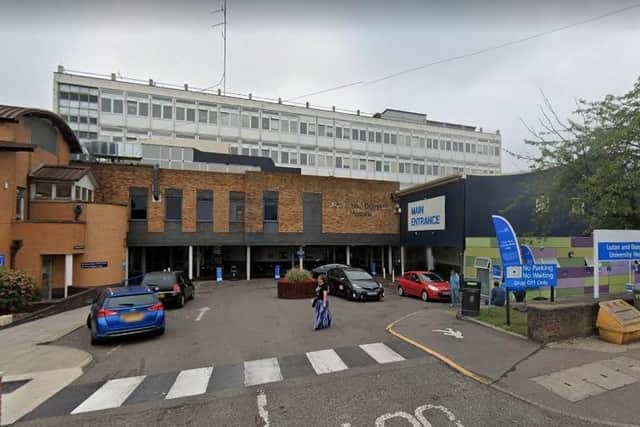A&E patient experience at Luton & Dunstable Hospital worsens
and live on Freeview channel 276
Patients' experience at Luton & Dunstable Hospital A&E worsened last year, new survey data suggests.
But Bedfordshire Hospitals NHS Foundation Trust has said there’s been unprecedented demand and department has been undergoing extensive redevelopment work which will help out in the long run.


Advertisement
Advertisement
Hospital regulator the Care Quality Commission (CQC) – which carried out the survey – said the long-term worsening of patient experience in NHS emergency care cannot be ignored.
The 223 respondents in Bedfordshire Hospitals NHS Foundation Trust gave the hospital emergency department an average of 7.3 out of 10 for overall experience in 2022.
It is down from a score of 8.3 out of 10 when the survey was last done in 2020.
Nationally, 18% of respondents gave a score of four or lower, with zero being a very poor experience. It was a leap from 8% two years prior.
Advertisement
Advertisement
The CQC has previously said high call volumes and staff shortages in NHS 111 are leading to delays in people receiving medical advice and more people going to A&E.
A lack of available GP and dental appointments means NHS 111 cannot always send people to those, leading to people being asked to call 999 or go to A&E instead, it added.
The survey also shows the proportion of people feeling they were treated with respect and dignity in hospitals across England declined from 81% in 2020 to 72% last year.
Patients gave Bedfordshire Hospitals Trust a grade of 8.4 out of 10 on the matter – down from 9 in the previous survey.
Advertisement
Advertisement
Dr Sean O’Kelly, the CQC’s chief inspector of healthcare, said staff are working extremely hard amidst challenging circumstances.
However, he added: "We cannot afford to ignore the long-term decline shown in relation to issues like waiting times, information provided when people leave to go home, access to pain relief and emotional support."
The proportion of patients across England who said they waited longer than four hours to be examined in A&E last year more than quadrupled to 17% – up from 4% in 2020.
In Bedfordshire Hospitals Trust, patients gave a score of 4.5 out of 10 regarding the length of time they waited to be examined – a fall from 7.1 two years earlier.
Advertisement
Advertisement
A spokesman for Bedfordshire Hospitals Trust said: “Overall, the CQC found that people’s experience of urgent and emergency care has worsened nationally, but our results remain in line with other trusts.
“Since 2020 our emergency departments have seen unprecedented demand and the number of patients attending the departments has substantially increased. In addition to this, both departments have been undergoing extensive redevelopment work that has caused some short-term disruption, but will provide significant long-term benefits for our patients.
“Improving patient flow and access is one of our key priorities and since the survey was carried out we have made a number of improvements within our emergency departments that we hope will address some of the issues raised. These include installing new CT scanners in both departments and introducing a new same day emergency care service. We are also working closely with our partners in the NHS and social care to support patient access and ensure patients are receiving the right care, in the right place.”
Dr Adrian Boyle, president of the Royal College of Emergency Medicine, said: "These results give a view of urgent and emergency healthcare through the eyes of the patient and reflect the challenges medical professionals working in urgent and emergency care experience every day."
Advertisement
Advertisement
"Every clinician wants to provide the best care possible. No-one wants patients to have to wait excessive amounts of time to be treated, or for that treatment to be administered in an environment – such as a corridor – which lacks privacy."